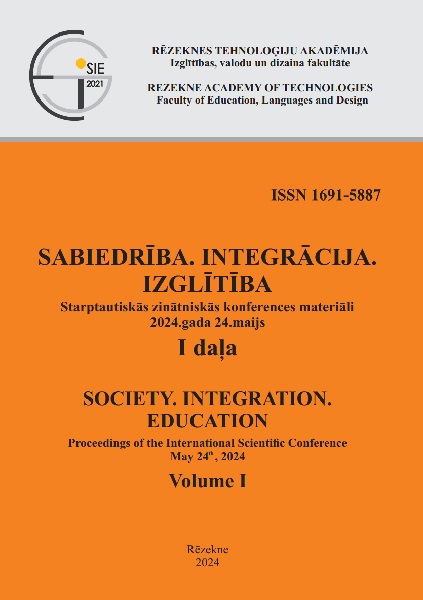(UN)USED POTENTIAL – THE PROCESS OF BECOMING INDEPENDENT BY YOUNG-ADULT FOSTER CARE CHILDREN
DOI:
https://doi.org/10.17770/sie2024vol1.7898Keywords:
care leavers, foster care, process of gaining independence, transition to adulthoodAbstract
The transition to adulthood of young people leaving foster care is an important research topic. The results of many international studies show that care leavers are at high risk of social exclusion. In 2023, an amendment to the Act on foster care was introduced in Poland to increase the number of successful transitions into adulthood. The aim of the empirical study we undertook was to analyse the relevance of long-term care solutions implemented in Poland for children leaving foster care, from the perspective of professional caregivers of the process of becoming independent. The study had the character of a field reconnaissance (Minski, 2017), as it allowed us to verify the issues undertaken before the next stage of the research. We decided to conduct individual in-depth interviews with guardians of empowerment. Our research shows that, despite many pertinent statutory solutions, in practice the system does not work as it should. The main problem is the systemic marginalization of carers' problems and the lack of substantive and psychological support for them.
References
Boyce, C., & Neale, P. (2006). Conducting In-Depth Interview: A Guide for Designing and Conducting In-Depth Interviews for Evaluation Input. Pathfinder International Tool Series, Monitoring and Evaluation-2.
Braun, V., & Clarke, V. (2006). Using thematic analysis in psychology, Qualitative Research in Psychology, 3(2),77-101, DOI:10.1191/1478088706qp063oa.
Brzezinska, A. (2017). Tozsamosc u progu dorosłosci. Wizerunek uczniow szkol ponadgimnazjalnych, Poznań: Wydawnictwo Naukowe Wydziału Nauk Społecznych UAM.
Camerona, C., Hollingwortha, K., Schoona, I., van Santenb, E., Schroerc, W., Ristikarid, T., Heinoe, T., Pekkarinen, E. (2018). Care leavers in early adulthood: How do they fare in Britain, Finland and Germany? Children and Youth Services Review, 87,163-172.
Chrzanowska, P. (2017). Proces usamodzielnienia wychowankow placowek opiekunczo-wychowawczych – wybrane aspekty, Studia BAS, 2(50),147–168.
Dawadi, S. (2020). Thematic Analysis Approach: A Step by Step Guide for ELT Research Practitioners. Journal of NELTA, 25(1-2), 62–71, DOI: https://doi.org/10.3126/nelta.v25i1-2.49731 .
Głowny Urzad Statystyczny. (2022). Pomoc społeczna i opieka nad dzieckiem i rodzina w roku 2022, Warszawa: Zakład Wydawnictw Statystycznych.
Golczynska-Grondas, A., Blaszczyk, M. (2020). Deinstytucjonalizacja placowek opieki całkowitej nad dziecmi i młodzieza w wojewodztwie lodzkim. Lodz: Wydawnictwo Uniwersytetu Lodzkiego i Regionalne Centrum Polityki Spolecznej w Lodzi, DOI: 10.18778/8220-399-08
Grotowska-Leder J., Rek-Wozniak M., Kudlinska I.(2016). Polityka przebiegu zycia – teoretyczne i metodologiczne ramy badan nad procesem osiagania doroslosci. Przeglad Socjologiczny, 2, 83–104
Grotowska-Leder, J. (2019).Osiaganie dorosłosci i mlodzi dorosli jako kategorie analiz socjologicznych. Przeglad Socjologii Jakosciowej, 15(4), 6–12, DOI: http://dx.doi.org/10.18778/1733-8069.15.4.01.
Guion, L.A., Diehl, D.C., & McDonald, D. (2011). Conducting an In-depth Interview: FCS6012/FY393, rev. 8/2011. EDIS, 8, DOI: https://doi.org/10.32473/edis-fy393-2011
Kancelarija Sejmu. (2024). Ustawa o wspieraniu rodziny i systemie pieczy zastepczej, z dnia 9 czerwca 2011 r. (Dz.U. 2011 nr 149 poz. 887). Retrieved from: https://isap.sejm.gov.pl/isap.nsf/download.xsp/WDU20111490887/U/D20110887Lj.pdf
Kohli, M. (2007). The institutionalization of the life course: Looking back to look ahead. Research in Human Development, 4(3-4),253–271.
Kudlinska-Chroscicka, I. (2019). Stawanie sie osoba dorosła w czasach plynnej nowoczesnosci w doswiadczeniu wielkomiejskich mlodych doroslych, Przeglad Socjologii Jakosciowej, 4, 34–60, doi: 0.18778/1733-8069.15.4.03.
Minski, R. (2017). Wywiad pogłebiony jako technika badawcza. Mozliwosci wykorzystania IDI w badaniach ewaluacyjnych. Przeglad Socjologii Jakosciowej, 13(3), 30–51. DOI: https://doi.org/10.18778/1733-8069.13.3.02
Piszczatowska-Oleksiewicz, M. (2014). Polscy gniazdownicy. O powodach, dla ktorych dorosle dzieci mieszkaja z rodzicami, Pogranicze. Studia Spoleczne, 24, 181-210.
Ruszkowska, M, Lovasova, S., (2023). Foster care system in Poland and Slovakia. Comparative analysis/ System pieczy zastepczej w Polsce i na Słowacji. Analiza porownawcza, Social Dissertations/ Rozprawy Spoleczne, 17, 227-238, DOI: 10.29316/rs/175191
Schnaiberg, A., Goldenberg, S. (1989). From Empty Nest to Crowded Nest: The Dynamics of Incompletely-Launched Young Adults Social Problems, 36 (3), 251-269. DOI: https://doi.org/10.2307/800694
Fundacja Dobrych Inicjatyw. (2023). Raport: Start w dorosłosc. Sytuacja mlodych dorosłych po doswiadczeniu zycia w instytucjonalnej pieczy zastepczej. Retrieved from: https://fdi.org.pl/
Stein, M. (2006). Research Review. Young people leaving care, Child and Family Social Work, 11(3), 273-279.
Winogrodzka, D. Sarnowska, J.(2019). Tranzycyjny efekt jojo w sekwencjach spolecznych mlodych migrantow, Przeglad Socjologii Jakosciowej, 15(4), 130–153, Retrieved from: https://doi.org/10.18778/1733-8069.15.4.07






